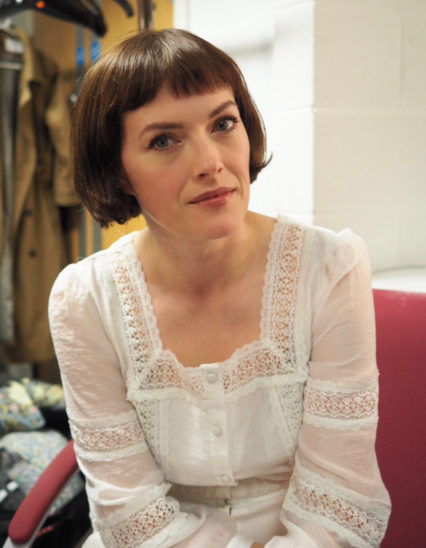Gwenno Saunders is a sound artist, DJ, radio presenter and singer from Cardiff. Her most recent album, the beautiful and haunting Le Kov, is a bold artistic statement performed entirely in Cornish, the language handed down to her by her parents. Craig Austin travelled to Cornwall to speak with Gwenno in advance of her show at Falmouth University, and to witness a performance of Le Kov in its spiritual home.
A Welsh woman in a white lace dress takes to the stage amidst a wash of lush psychedelic sounds. Clutching a tambourine and prowling her territory like a latter-day Siouxsie Sioux she plays out a scene of theatrical sonic drama to a backdrop of stark archive imagery.
Singing in Cornish to a Falmouth audience that contains only a tiny contingent of Cornish speakers we watch as she negotiates a delicate balancing act between mystery and community; one that culminates in a rare but pertinent lapse into the English language: ‘A tongueless man has lost’ she solemnly declares to a wave of appreciative applause. Gwenno Saunders is about to take us on a journey to an imaginary place…
Between Land’s End and Scilly Rocks, sunk lies a city that the ocean mocks,
A bustling metropolis, links reaching the furthest seas,
A Cornish capital, the place of memory.
 When Arctic Monkeys won the 2006 Mercury Music Prize for their debut album Whatever People Say I Am, That’s What I’m Not they very graciously instructed the assembled audience to ‘Call 999’ on the basis that ‘Richard Hawley’s been robbed’. At the time it represented nothing more than a noble doffing of a flat-cap to an overlooked steel-city comrade but it also shone a light upon the perennial critical dispute that accompanies the announcement of that particular award’s annual short-list.
When Arctic Monkeys won the 2006 Mercury Music Prize for their debut album Whatever People Say I Am, That’s What I’m Not they very graciously instructed the assembled audience to ‘Call 999’ on the basis that ‘Richard Hawley’s been robbed’. At the time it represented nothing more than a noble doffing of a flat-cap to an overlooked steel-city comrade but it also shone a light upon the perennial critical dispute that accompanies the announcement of that particular award’s annual short-list.
In a year in which the Mercury has proffered a list that struck most as being on the extreme end of conservative, it’s especially galling that Gwenno Saunders’ Le Kov, a gorgeous psychedelic exploration of identity and place performed entirely in the Cornish language, was not also in the running. Le Kov translates into English as ‘the place of memory’, but throughout our conversation Gwenno will refer to it only as ‘the Cornish record’, a somewhat self-deprecating take on a beautifully hypnotic album that has the power to both thrill and beguile, and one that has a much wider contemporary resonance within our culture and political discourse
When we meet pre-show in Falmouth, a ‘bringing it all back home’ celebration of Le Kov’s musical and cultural impact, I congratulate Gwenno on her recent Welsh Music Prize nomination – she herself being a recipient of the award in 2015 for Y Dydd Olaf – while expressing my surprise and regret at the Mercury omission:
‘I just think it’s a shame that the Mercury has never had a nomination for an album that’s not in English,’ she graciously reflects, ‘which is quite shocking really when you consider how many languages are spoken across the UK and Ireland. That was the only thing I really chose to take from it and the fact that the panel’s focus is quite London-centric, which is inevitable given where they mainly live. I was just so pleased that Nadine Shah was nominated (for Holiday Destinations). Her album is amazing, she’s such a good performer and sonically it’s brilliant. It’s massively dark and it has all that fire and aggression and frustration that reflects how a lot of us are feeling at the moment. Her performance on the night was astonishing and though I might not have been nominated at least there was someone there representing how I feel. If there had been another album nominated that wasn’t in English I would have been equally happy, it’s that diversity more than anything else that matters to me.’
‘Music isn’t a competition,’ she adds, ‘but with something like that kind of award you’d always want it to reflect the musical landscape of a nation, or in this case a group of nations.’
It might help that Gwenno releases records including Le Kov through Jeff Barrett’s famously maverick Heavenly label but in a similar vein I wonder, even given this, whether she struggles with the seemingly eternal contest between art and commerce: ‘I think that because of the journey we’ve gone on, the fact that we put the first record out ourselves and then Heavenly picked it up, I’m not sure how much we feel the same kind of pressure that others might. No-one really expected the last record to do as well as it did, it wasn’t a worldwide hit or anything but it sustained itself and the same thing has happened with the Cornish record really. I was speaking to Jeff the other day and made sure he knew how thankful I was for his support. When he initially asked me what I intended to do next and I said that I wanted to do a record in Cornish he simply said, “OK then. Let’s go down to St. Ives, let’s meet some people”. He has this belief in “the magic” – Heavenly’s tag-line – the romance of it all, and it’s got nothing to do with the algorhythmic kind of pop that you hear on commercial radio. That kind of music is like having a Diet Coke, it misses all of the elements that make music magical, that sense of place, that sense of community, of people coming together in a shared love of something, and it makes me sad’
 That sense of place permeates every note of Le Kov and I can only imagine what it must feel like to perform these songs to a Cornish audience in a historic language whose native speakers number no more than a thousand; one that was passed down to her by her Cornish-speaking family: ‘Part of the reason I made the record was to connect with people, and a place, in a language that I – randomly – speak as a Welsh person living in Cardiff. It’s been a lovely experience and a massive journey, connecting with the people of Cornwall and the arts community here. Getting to meet people who create in different disciplines, because it’s always about conversations I think. When you make stuff you’re looking to connect perhaps with other people who share similar ideas and that’s been really exciting. Writers and film-makers who are seeking to define a distinctive Cornish voice but one that’s not rooted in nostalgia. I finally feel that through this connection I have some kind of ownership of this language I’ve been given. Cornwall is a beautiful place but it also has its own challenges, the reality of rural poverty, the lack of opportunity, and in that sense there are a lot of similarities with Wales.’
That sense of place permeates every note of Le Kov and I can only imagine what it must feel like to perform these songs to a Cornish audience in a historic language whose native speakers number no more than a thousand; one that was passed down to her by her Cornish-speaking family: ‘Part of the reason I made the record was to connect with people, and a place, in a language that I – randomly – speak as a Welsh person living in Cardiff. It’s been a lovely experience and a massive journey, connecting with the people of Cornwall and the arts community here. Getting to meet people who create in different disciplines, because it’s always about conversations I think. When you make stuff you’re looking to connect perhaps with other people who share similar ideas and that’s been really exciting. Writers and film-makers who are seeking to define a distinctive Cornish voice but one that’s not rooted in nostalgia. I finally feel that through this connection I have some kind of ownership of this language I’ve been given. Cornwall is a beautiful place but it also has its own challenges, the reality of rural poverty, the lack of opportunity, and in that sense there are a lot of similarities with Wales.’
It may be an album steeped in the historic tongue of an ancient peninsula but one of Le Kov’s finest achievements is that it remains, at heart, a defiantly outward-looking album rather than a narrow or insular one. A refreshing approach to taking care of business that sits at odds with our increasingly regressive and dystopian experience. ‘The whole Brexit thing is very depressing,’ Gwenno says, ‘but I felt that I wanted to find a positive way of reacting to it and for me that ended up being this imagination of a sunken city under the sea. One in which I could live and have complete freedom, somewhere that felt like a pretty good place to go to. A world that encourages creativity and truth and encourages people to be who they want to be.’
‘Did you see that clip of Bobby Gillespie on TV with Andrew Neil?’ she suddenly asks, immediately enlivened by the image of the singer’s recent refusal to engage with the grotesque charade of political debate being reduced to the level of pantomime; a clip that has since taken on a global online life of its own. ‘How amazing was that? That is just so iconic in terms of that being the truth of an artist. Creativity and art is absolutely where you find your truth in terms of expressing creative ideas. I just thought it was so perfectly reflective of how artists get treated. As if they’re either idiotic or ignorant of politics and political thought. As if they’re silly, or flippant, or unimportant.’
I put it to Gwenno that in that moment, Gillespie, the one-time stand-up drummer of the embryonic Jesus and Mary Chain, came across as the only adult in the room.
‘That’s what was so amazing. I felt that it was just so true. Authorities are so quick to rubbish things for being different, or out-there, or whatever, but in that moment it was all about the reaction of the artist and all about the truth. I thought it was just amazing. You compare that with the early days of the Sex Pistols when the media tried to turn Johnny Rotten into a cartoon. This was the complete opposite with the supposedly serious commentators making themselves look like absolute fools. It was incredible, the whole absence of self-awareness. I’ve not seen anything that powerful in a long time. I can’t remember the last telly moment like that and I’m not sure there even has been an equivalent one in our generation.’
 Fresh from a European tour with Suede – ‘it was amazing to witness the boldness of it and the levels of energy’ – this British tour of Le Kov, and the opening show of Sŵn, it’s perhaps Gwenno’s recent performance at the Cardiff Festival of Voice, Edrica, that has underlined her perpetual desire to innovate and surprise. It was for some startling, as my colleague John Lavin comments in his recent review of the show, to hear Gwenno sing in English for what may be the first time since her days in The Pipettes. ‘Yes!’ she exclaims. ‘Well, I have three languages, and my approach has always been to use what I’ve got. Whatever feels right at the time is what I use. That is the absolute basis of what I’m trying to do. That’s exciting to me and I don’t think beyond that really. I’ve been scared to use Cornish for so long and it got to the point that I finally thought “just do it!”. Using Edrica’s poetry was really interesting and it was nice to put into context as she was someone who’d moved from England to Wales. She kept her identity and her language but had also embraced where she was living and became part of that society. Who she was before hadn’t faded away though and I really liked that about her, I found it really interesting.’
Fresh from a European tour with Suede – ‘it was amazing to witness the boldness of it and the levels of energy’ – this British tour of Le Kov, and the opening show of Sŵn, it’s perhaps Gwenno’s recent performance at the Cardiff Festival of Voice, Edrica, that has underlined her perpetual desire to innovate and surprise. It was for some startling, as my colleague John Lavin comments in his recent review of the show, to hear Gwenno sing in English for what may be the first time since her days in The Pipettes. ‘Yes!’ she exclaims. ‘Well, I have three languages, and my approach has always been to use what I’ve got. Whatever feels right at the time is what I use. That is the absolute basis of what I’m trying to do. That’s exciting to me and I don’t think beyond that really. I’ve been scared to use Cornish for so long and it got to the point that I finally thought “just do it!”. Using Edrica’s poetry was really interesting and it was nice to put into context as she was someone who’d moved from England to Wales. She kept her identity and her language but had also embraced where she was living and became part of that society. Who she was before hadn’t faded away though and I really liked that about her, I found it really interesting.’
‘It’s a really interesting festival and it’s evolving to become something really exciting. There’s a lot of ambition there and it really puts Cardiff on the map. It was really interesting to travel around Europe with Suede and to land back in Cardiff and think that this isn’t the town I grew up in. I found that exciting though. The sense that this is now everyone’s city, and even though I’m a born and bred Cardiffian I can’t necessarily claim this city anymore. It belongs to everyone now. It’s such a positive feeling. It’s not that post-industrial town it once was and neither is it quite that international city that it wants to be, but it’s certainly on the way. My favourite band is Young Marble Giants, the absolute knowing of what’s right, the clarity of the music, but they were very much of a place and a time, a very different Cardiff. Something like that could have the same kind of influence now but it wouldn’t be in terms of grey Cardiff streets. Much like Manchester’s evolved over time.’
And as for the next album?
‘Our aim now is to just make a better record. But it’s funny. When you make an album and it’s finally complete and you think to yourself “how the hell are you going to do that again?” You put everything you have into it and wonder if there’s anything else within you that you can find. But you eventually regroup. It’s like going through the seasons, a new dawn and new ideas. And it’s great when that feeling comes along again’
With Le Kov Gwenno has set herself a dauntingly high benchmark but one that has evidently inspired and been celebrated by the people of this beguiling and beautiful peninsula. As the haunting refrain of Tir Ha Mor (Land and Sea) casts it spell upon this animated Falmouth audience it’s difficult to argue with the artist’s assertion that ‘this album is a combination of accepting the culture which your parents have valued enough to want to pass on to you, regardless how small, and utilising it in a positive way to try and make sense of the world around you. It’s also about having to accept and respect the nuances that make us all different and discovering that all of our stories share the same truth.’
Le Kov is out now on Heavenly Records.
Gwenno plays a string of dates in support of Manic Street Preachers in May of next year.
All photography by Craig Austin.
You might also like…
For over ten years, Cate Le Bon has taken her fans on perhaps some of the most fascinating journeys of any modern musician. Caragh Medlicott recounts those journeys, that span the globe with an array of unusual stop-offs while listening to the latest album, Reward.
Craig Austin is a regular contributor to Wales Arts Review.












